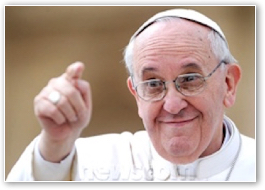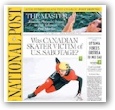The Pope's Judgments
- FATHER RAYMOND J. DE SOUZA
Popes are often critical of certain points of view. Francis is unusual in that he frequently comments upon the moral status of the people involved.
 At the funeral for Antonin Scalia in the U. S. capital, I would have expected that any discussion about sharp disagreements and blunt talk in public discourse would be about the late supreme court justice, whose opinions were famous for both. From my vantage point in the sanctuary, my direct line of sight fell upon the visage of America's most powerful man, Justice Anthony Kennedy, who, as the court's swing vote, alone gets to decide all manner of vexing questions for the nation. About his majority opinion last year creating a constitutional right to same-sex marriage, Scalia wrote that had he been party to such a decision, he "would hide my head in a bag." It was Scalia's extraordinary talent for friendship that enabled him to get on famously, even with his judicial adversaries, and Justice Kennedy, appearing with his head held high, looked sincerely grief-stricken at the loss of his colleague for almost three decades on the court.
At the funeral for Antonin Scalia in the U. S. capital, I would have expected that any discussion about sharp disagreements and blunt talk in public discourse would be about the late supreme court justice, whose opinions were famous for both. From my vantage point in the sanctuary, my direct line of sight fell upon the visage of America's most powerful man, Justice Anthony Kennedy, who, as the court's swing vote, alone gets to decide all manner of vexing questions for the nation. About his majority opinion last year creating a constitutional right to same-sex marriage, Scalia wrote that had he been party to such a decision, he "would hide my head in a bag." It was Scalia's extraordinary talent for friendship that enabled him to get on famously, even with his judicial adversaries, and Justice Kennedy, appearing with his head held high, looked sincerely grief-stricken at the loss of his colleague for almost three decades on the court.
Yet all the political talk in Washington was not about Scalia's sharp pen, but rather the exchange between Pope Francis and Donald Trump. On his return flight from Mexico to Rome, the Pope, in response to a press question about Trump's plan to build a wall along the U. S. Mexican border, replied that someone who thinks only about walls, and not bridges, "is not Christian." Trump replied that it was "disgraceful" for a religious leader to question the faith of another.
It surprised many, but Pope Francis speaks this way all the time, delivering strong judgments about a vast array of people. Usually, however, out of papal deference, those so castigated do not respond. Trump did, and at the moment he has a megaphone that is, as he would put it, huge.
Last September, on his return from Philadelphia to Rome, the Pope said that the mayor of Rome, Ignazio Marino, only "pretends to be Catholic." Also in September, Francis said that "if you can't forgive, you are not a Christian." Last June, he said those who manufacture armaments are "dishonest" if they call themselves Christians. In February 2015, he said that those insufficiently solicitous of the natural environment are Christians "who do not care about the work of God."
"There's no public figure in the world today with an image defined by a more misleading sound bite than Pope Francis…"
Popes are often critical of certain points of view, or sometimes specific public policies, even if usually they restrict themselves to principles. Francis is unusual in that he frequently comments upon the moral status of the people involved, as well. In that, the Pope is almost unique. It would be impossible to imagine a Catholic bishop in Canada, despite strong disagreement on this or that issue, saying that Prime Minister Justin Trudeau or former prime minister Stephen Harper is not a Christian.
"There's no public figure in the world today with an image defined by a more misleading sound bite than Pope Francis, whose signature line from almost three years ago remains, 'Who am I to judge?'" wrote John Allen, the world's leading Vatican reporter in English, just days before the Trump remarks. "Reality couldn't be more different. In truth, Francis is one of the most 'judgmental' figures around, in the sense of never pulling punches when he thinks something is wrong."
An entirely novel aspect of the Francis-Trump exchange is that the attacked party responded. Usually, the Holy Father targets people within the church who, out of papal deference, say nothing. Last October, he spoke of bishops who opposed various liberalizing proposals on marriage and family life as desiring to "indoctrinate (the Gospel) in dead stones to be hurled at others." The bishops, many of whom felt calumniated by the Pope, offered nary a peep in response. Trump is the first prominent figure to protest a papal rebuke. Whether that remains a one-off, or marks a change in how papal rhetoric is received, remains to be seen.
For a man who has not watched television since 1990, Pope Francis is a master of public conversation in a reality-show culture. The sharp insult is what garners attention, something Trump would be expected to know. That the Pope knows it too is remarkable.
"Harsh and divisive language does not befit the tongue of a pastor," Pope Francis told the American bishops last September. "It has no place in his heart."
It's not evident what Pope Francis means by that. Jesus Himself spoke harshly. Not always, but on occasion: "brood of vipers," "shake the dust off your feet at them," "hypocrites." It's a way of speaking that pastors have not used for rather a long time. Pope Francis has brought it back, and it took Donald Trump for people to notice.
 This is Meaghen Gonzalez, Editor of CERC. I hope you appreciated this piece. We curate these articles especially for believers like you.
This is Meaghen Gonzalez, Editor of CERC. I hope you appreciated this piece. We curate these articles especially for believers like you.
Please show your appreciation by making a $3 donation. CERC is entirely reader supported.

Acknowledgement
 Father Raymond J. de Souza, "The Pope's judgments." National Post, (Canada) February 23, 2016.
Father Raymond J. de Souza, "The Pope's judgments." National Post, (Canada) February 23, 2016.
Reprinted with permission of the National Post and Fr. de Souza.
The Author
Father Raymond J. de Souza is the founding editor of Convivium magazine.
Copyright © 2016 National Post



